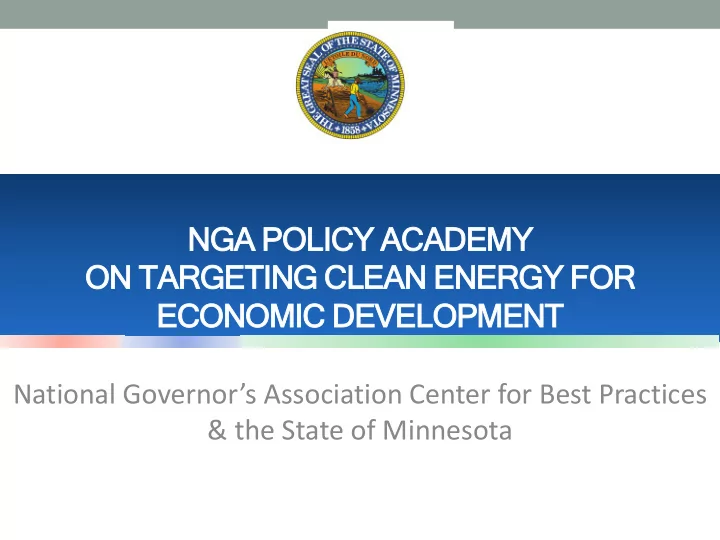

NGA A POLICY A Y ACAD ADEMY ON T TARGETI ETING C CLEAN EAN ENER ERGY F Y FOR ECONOMIC D DEVEL EVELOPM PMEN ENT National Governor’s Association Center for Best Practices & the State of Minnesota
Governors are uniquely positioned to… • Bring public and private stakeholders together • Encourage work across traditional state agency jurisdictions • Leverage state strengths and opportunities • Advance policy innovation
Governor Dayton’s 7 Priorities for Job Creation Invest in infrastructure, such as roads, bridges, border-to-border and 1. high-speed Internet. Increase exports of state products, and entice foreign investment in 2. Minnesota. Increase access to capital for new businesses and small businesses. 3. Continue reform efforts, improving services and reducing cost. 4. Continue to streamline government regulations. 5. Align our education system to prepare Minnesotans for the jobs in 6. demand. Close the educational achievement and employment and maximize the 7. potential for all Minnesotans regardless of race, class and place in Minnesota
Minnesota’s Unique Strengths • Starting from a strong policy foundation: Policy leadership, especially in renewable energy (RES), energy efficiency, and biofuels 3 rd in the nation in wind power generation • Strong Assets: Abundance of natural resources Concentration of Fortune 500 companies Strong research universities • Poised for Continued Growth One of fastest growing economies Highly educated workforce
Minnesota’s Unique Strengths Cont. • National leader in setting aggressive clean and renewable energy standards • Strong industries in wind, solar, biomass, energy efficiency, advanced transportation and green chemistry • Leadership poised to work closely with national experts to develop strategic action plan to set priority for state clean energy and economic development.
Participants • Ellen Anderson, Senior Advisor to the Governor (Co-Chair) • Robin Sternberg, Deputy Commissioner, DEED (Co-Chair) • Bill Grant, Deputy Commissioner, Commerce (Co-Chair) Core Team • Will Seuffert, Executive Director, Environmental Quality Board • Representative Melissa Hortman, Chair, Energy Committee, MN House of Representatives • Molly Pederson, Policy Advisor, Governor’s Office Katie Clark Sieben, Commissioner, DEED Pete Klein, St. Paul Port Authority • • • Nancy Lange, Commissioner, Public Utilities • Dave McMillan, Minnesota Power Commission • Michael Noble, Fresh Energy Expanded • Dave Frederickson, Commissioner, Agriculture • Bruce Peterson, St Cloud Community and • Matt Entenza, Senior Advisor to the Governor Technical College • Tracy Anderson, 3M • Sherry Ristau, Southwest Initiative Foundation Pete Aube, Potlatch Lumber Beth Soholt, Wind on the Wires • • Team • Bill Blazar, Minnesota Chamber of Commerce • Sheldon Strom, Center for Energy and Environment • Bill Faulkner, Red Oak Holdings • David Saggau, Great River Energy • Ben Fowke, Xcel Energy, Inc. • Ken Smith, District Energy St. Paul • David Foster, BlueGreen Alliance • Teresa Spaeth, Agricultural Utilization • Cheryal Hills, Region 5 Development Research Institute • Lynn Hinkle, MN Solar Energy Industries Assn. • Steve Kelley, Humphrey School of Public Affairs • GreaterMSP Partnership • Climate Adaptation Team • Bio Business Alliance of Minnesota- • Minnesota Electric Auto Association Key • Regional Development Commissions • Defense Alliance • Biofuels Task Force • Natural Resources Rehabilitation Institute- University of Minnesota. • Agricultural Utilization Research Institute • BlueGreen Alliance • Minnesota Forest Industries Stakeholders • Fresh Energy • Great Plains Institute • Corn Growers Association • MN Energy Workforce Consortium • Minnesota Power • Minnesota Clean Tech Open Great River Energy • • Center Point Energy • Minnesota Pollution Control Agency • Department of Natural Resources
Foundations for Comprehensive Strategy • Existing cabinet-level initiatives focusing on economic development and energy/clean tech/environmental Policy: • Environmental Quality Board • Minnesota Business First Stop • Next Gen Energy Board • Other Key Efforts: • Solar Manufacturing Roundtable • Solar Incentives • Minnesota Forest Resource Council • Sweden- Minnesota Bioenergy MOU • Industry Research – U of M, AURI, NRRI • Supply Chain Survey
Foundations for Comprehensive Strategy cont.
Minnesota’s Challenges • Barriers and agency silos • Need for capital to support emerging industries • Need correlation between clean energy, state domestic product, economic development, and job creation • Market and policy uncertainty • Need for R&D to bring technology to commercialization
Purpose of the Policy Academy • Identify opportunities for growth and job creation up and down the supply chain • Identify most effective strategies to grow key sectors • Create comprehensive plan bridging clean energy and economic development across agencies • Leverage expertise and support of private/NGO/philanthropy/academic sectors
Clean Energy in Minnesota Sectoral Employment Distribution, 2012 • DRAFT PRELIMINARY: • In 2012, there were 16,701 clean energy jobs • Average annual wage per worker of $65,231 in 2012. • Total payroll paid by Minnesota firms exceeded $17 billion in the 15-year period.
Industry Engagement Objectives • Validate market data and research - supply and demand, key drivers, financial instruments, investor preferences, customers, workforce • Identify barriers and gaps • Focus on and prioritize key opportunities • Develop recommendations to drive industry sectors
Engagement Outcomes • Establish baseline data to track and measure outcomes • Stakeholder agreement for a cohesive plan and set of recommendations • Strengthen ecosystem and industry partnerships
THANK YOU! • QUESTIONS? • Kari Howe • Kari.howe@state.mn.us
Recommend
More recommend